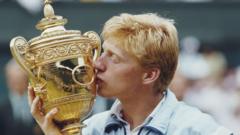Did Becker Regret Winning Wimbledon at Just 17?

Published: 2025-09-24 13:40:17 | Category: sport
Six-time Grand Slam champion Boris Becker has expressed regret over winning Wimbledon at just 17 years old, highlighting the immense pressure and scrutiny that followed him throughout his career. Becker, who became the youngest men's singles champion at Wimbledon in 1985, discussed how this early triumph shaped his life and career, both positively and negatively.
Last updated: 13 October 2023 (BST)
Key Takeaways
- Boris Becker won Wimbledon at 17, becoming the youngest men's singles champion in history.
- He later expressed regret about the pressures this victory placed on him.
- Becker faced personal and financial challenges throughout his life.
- He served eight months in prison for financial misconduct before being released in 2023.
- Despite past challenges, he finds inspiration in the success of current players like Novak Djokovic.
The Historic Win at Wimbledon
Boris Becker’s victory at Wimbledon in 1985 marked a pivotal moment in tennis history. At 17 years, seven months, and 15 days old, he defeated South African player Kevin Curren in the final, solidifying his status as a prodigy. This accomplishment not only made Becker a household name but also set the stage for a career that would include a total of six Grand Slam titles.
The Pressure of Early Fame
In a recent interview, Becker reflected on the burdens that accompanied his early success. He noted that being thrust into the spotlight at such a young age made it difficult to navigate the complexities of adulthood. “Whatever you do, wherever you go, whoever you talk to, it becomes a world sensation,” he stated, illustrating how every aspect of his life was scrutinised by the media.
The Impact on His Career
Becker's early triumph not only defined his initial career but also cast a long shadow over his subsequent achievements. He stated, “When you start a second career, everything is measured at this success of winning Wimbledon at 17.” This perspective emphasises how difficult it can be for young athletes to transition from prodigy to a well-rounded adult, facing the inevitable ups and downs of life.
Life After Tennis: Trials and Tribulations
Having retired from professional tennis in 1999, Becker sought to establish himself as a commentator and coach. His coaching stint with Serbian star Novak Djokovic from 2013 to 2016 was particularly noteworthy, as they together celebrated numerous victories, including six Grand Slam titles. However, Becker's personal life was marred by challenges, including financial instability and legal issues.
Financial Difficulties and Legal Issues
In 2022, Boris Becker faced severe financial difficulties that led him to conceal £2.5 million worth of assets to avoid paying debts. This resulted in a two-and-a-half-year prison sentence, of which he served eight months before being released in early 2023. His time in prison has profoundly impacted his outlook on life, prompting him to take responsibility for his actions and reflect on his past decisions.
Reflection on Past Choices
Becker openly acknowledged that his early success contributed to a lifestyle that he now views as detrimental. “I was too comfortable. I had too much money. Nobody told me 'no'—everything was possible,” he remarked. This candid admission highlights the dangers of sudden fame and fortune, particularly for young athletes.
Finding Inspiration in Novak Djokovic
Despite his challenges, Becker has found solace in the success of Novak Djokovic. He expressed pride in Djokovic's achievements, particularly during the 2022 Wimbledon tournament, where Djokovic clinched the title against Nick Kyrgios. Becker stated, “That was very inspirational for me,” reflecting on how witnessing Djokovic's success provided him with perspective during a difficult time.
The Future: Learning from the Past
As Becker continues to navigate life post-prison, he emphasizes the importance of accountability. He believes that while the past is unchangeable, one can influence the future. “You can only change the future because you live in today,” he asserted, indicating a commitment to making better choices moving forward.
Conclusion: The Price of Early Success
Boris Becker's journey serves as a poignant reminder of the complexities surrounding early success in the world of sports. While his achievements at Wimbledon will forever be celebrated, the accompanying pressures and subsequent challenges have shaped his life in profound ways. As he moves forward, Becker's story encourages reflection on the balance between ambition and personal well-being, highlighting that success is not merely measured in titles but also in the lessons learned along the way.
What does Becker's story teach us about the pressure of success in sports? How can young athletes be better prepared for the challenges that come with fame? #BorisBecker #Wimbledon #Tennis
FAQs
When did Boris Becker win Wimbledon?
Boris Becker won Wimbledon on 7 July 1985, becoming the youngest men's singles champion at the age of 17 years, seven months, and 15 days.
How many Grand Slam titles did Boris Becker win?
Boris Becker won a total of six Grand Slam titles during his career, including three Wimbledon championships.
What legal issues has Boris Becker faced?
Boris Becker faced legal issues related to financial misconduct, resulting in an eight-month prison sentence for concealing assets to avoid paying debts.
Who did Boris Becker coach after retiring from tennis?
After his retirement, Boris Becker coached Serbian tennis player Novak Djokovic from 2013 to 2016, contributing to Djokovic's success in multiple Grand Slam tournaments.
What lessons has Becker learned from his experiences?
Boris Becker has emphasised accountability for his actions, stating that while the past cannot be changed, one can influence the future through better choices.



